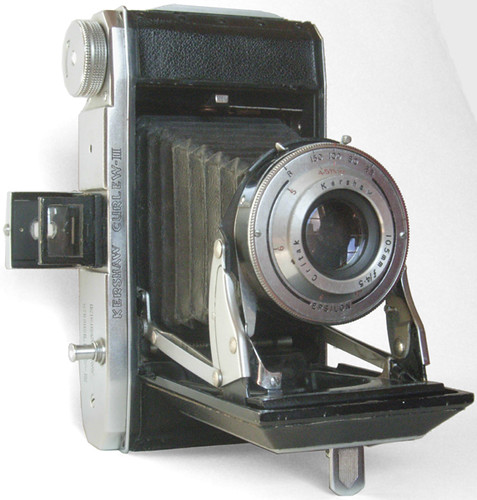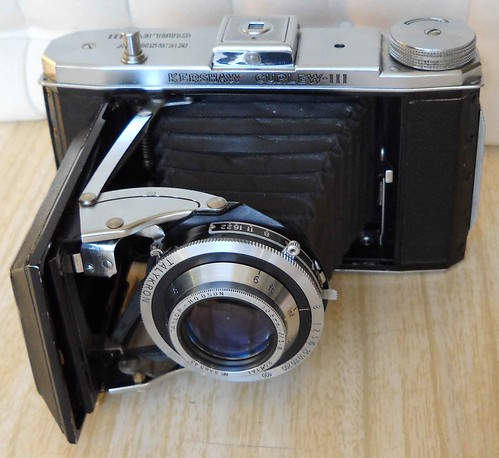Difference between revisions of "Kershaw Curlew"
Hanskerensky (talk | contribs) m (→Links: Redirected Link URL to archived version) |
Hanskerensky (talk | contribs) m (Redirected Link URL to archived version) |
||
| Line 12: | Line 12: | ||
[[Kershaw-Soho|Kershaw]] of Leeds, England, prototyped the Curlew in 1947, but production ran from 1950-1952. Three models were produced concurrently, offering different levels of specification, particularly of the lens and shutter. All the lenses offered were coated. | [[Kershaw-Soho|Kershaw]] of Leeds, England, prototyped the Curlew in 1947, but production ran from 1950-1952. Three models were produced concurrently, offering different levels of specification, particularly of the lens and shutter. All the lenses offered were coated. | ||
| − | It has been stated widely<ref>{{McKeown}}, p458</ref> that less than 300 Curlews were made in total, over all three models. Camera dealers F and S Marriott<ref>[http://www.marriottworld.com/pieces/pieces28.htm | + | It has been stated widely<ref>{{McKeown}}, p458</ref> that less than 300 Curlews were made in total, over all three models. Camera dealers F and S Marriott<ref>[https://web.archive.org/web/20170324063359/http://www.marriottworld.com/pieces/pieces28.htm Fred and Stephanie Marriott's 'Pieces' no. 28] (archived)</ref> are more cautious, stating only that 'there do not appear to have been many of these cameras made, they were not widely advertised and by 1950 they seem to have disappeared'. However, a persuasive argument has been made by UK collector John Vaughan that some ''thousands'' were made<ref>This argument is made in a post on the UK-based web forum [http://www.ephotozine.com/ ePhotozine]. [http://www.ephotozine.com/photo/a-proverbial-hen-s-tooth---kershaw-curlew-111-15074988 This post] by user 'HobbitDave' accompanying a photo of a Curlew III, states that only about 80 of this model were made. However, a response from Vaughan (the 23rd response to the post, also viewable in John Vaughan's [http://www.ephotozine.com/u142821/activity activity page]) states that '''60''' examples of the Curlew II and '''76''' of the III have been recorded. He adds that serial numbers for these known examples of the Curlew II and III range from ''3/5930'' to ''3/10053'', and that examples are known with serial numbers in most number-bands of 100. It is thus implied, though not explicitly stated, that about ''four thousand'' of these cameras may have been made.</ref>. |
{| | {| | ||
Revision as of 05:19, 8 July 2022

|
| Curlew II image by AWCam (Image rights) |
The Kershaw Eight-Twenty Curlew is a heavily-built folding camera taking eight 6x9cm exposures on 120 rollfilm. Kershaw of Leeds, England, prototyped the Curlew in 1947, but production ran from 1950-1952. Three models were produced concurrently, offering different levels of specification, particularly of the lens and shutter. All the lenses offered were coated.
It has been stated widely[1] that less than 300 Curlews were made in total, over all three models. Camera dealers F and S Marriott[2] are more cautious, stating only that 'there do not appear to have been many of these cameras made, they were not widely advertised and by 1950 they seem to have disappeared'. However, a persuasive argument has been made by UK collector John Vaughan that some thousands were made[3].
| Model | Lens | Shutter |
| Curlew I | Kershaw Critak 105mm f6.5 | 3-speed |
| Curlew II | Kershaw Critak 105mm f4.5 | Epsilon 4-speed, 1/25-1/150 |
| Curlew III | Taylor-Hobson Roytal 105mm f/3.8 | Talykron 1-1/400 s |
| Curlew III | Taylor-Hobson Roytal 105mm f/4.5 | Epsilon 1/25-1/150[4] |
Models II & III have double-exposure prevention; the III has a frame-measuring device to stop winding at the correct point - which adds a small switch to the back of the top-plate, marked FREE/LOCK. The name and model is inscribed both on the top plate, behind the shutter release, and on the front - below the viewfinder.
The top plate has a flip-up optical viewfinder, with a
"ready to expose" indicator, showing black when winding is required and red when ready. The back door is plain except
for an octagonal red window, with a thumb-knob-operated internal cover. The folding bed is released by a large button in the base. The film spools sit in hinged carriers to aid insertion and removal.

|
| Kershaw Curlew III image by johnnyh4 (Image rights) |
Notes
- ↑ McKeown, p458
- ↑ Fred and Stephanie Marriott's 'Pieces' no. 28 (archived)
- ↑ This argument is made in a post on the UK-based web forum ePhotozine. This post by user 'HobbitDave' accompanying a photo of a Curlew III, states that only about 80 of this model were made. However, a response from Vaughan (the 23rd response to the post, also viewable in John Vaughan's activity page) states that 60 examples of the Curlew II and 76 of the III have been recorded. He adds that serial numbers for these known examples of the Curlew II and III range from 3/5930 to 3/10053, and that examples are known with serial numbers in most number-bands of 100. It is thus implied, though not explicitly stated, that about four thousand of these cameras may have been made.
- ↑ McKeown lists this version with, surprisingly, a downgraded lens and shutter
Links
- Curlew II article by Adam Costello's Classic Cameras
- List of serial numbers (archived)